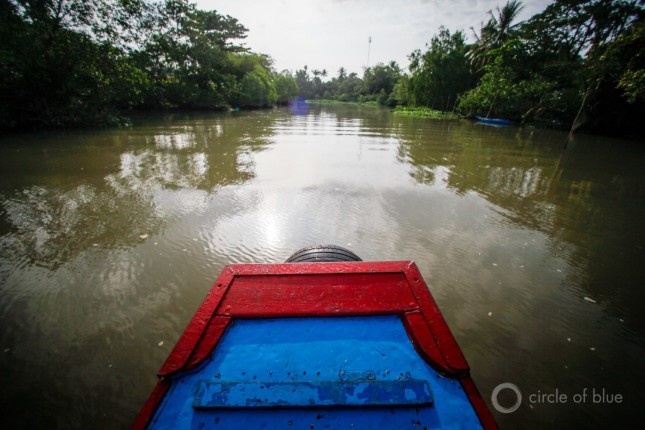-
Four International Water Stories to Watch in 2021
February 9, 2021 By Brett Walton
The travails of the last year, when a bat virus infected humans and turned the world upside down, were an unfortunate reminder of the inseparable ties between society and the natural environment.
So it is with water, which will again this year direct the course of history, through events small and large.
What are the large events to pay attention to? What are the trends and flashpoints?
The fallout from the pandemic will continue to cast a shadow. So will negotiations between countries that share major rivers with unsettled politics, like the Mekong and Nile.
Stuart Orr, who leads the freshwater practice at WWF, said that 2021 will bring more awareness of the water risks for businesses and the need to restore ecosystems to build resilience to rising seas, stronger storms, and harsher droughts. The Climate Adaptation Summit on January 25-26 will set the stage for more discussion of the topic at the UN climate conference in Glasgow in November.
Here are four other water stories to watch in 2021.
Covid Recovery
The pandemic brought about one of the most significant reversals of fortune in recent history.
The World Bank expects that 88 million to 115 million people to fall into extreme poverty this year, meaning that they live on less than $1.90 a day. This is after three decades of near-continuous reductions in extreme poverty.
The economic damage is still being tallied, but it will be felt by individuals and governments alike. More poverty will impede efforts to extend safe water and adequate sanitation. Water utilities will struggle financially and need more support.
There is opportunity in crisis, though. Both to revamp utility services to meet the digital age and to elevate the importance of water, sanitation, and hygiene. If anything, the pandemic should remind governments and aid agencies that water and health go hand in hand.
Famine Warnings
Hunger is on the rise, as well, highlighting the punishment that overlapping environmental crises can wield.
Relief agencies like the International Rescue Committee have issued alerts that food aid is needed across a swathe of Africa’s Sahel region. Millions of people in Afghanistan, Ethiopia, and Yemen also face acute hunger due to drought, floods, political violence, and reduced household income during the pandemic. If La Niña conditions persist, these areas would see continued dryness in the early months of 2021.
The central states of South Sudan are among the most concerning, at risk of approaching famine levels unless they receive international intervention, according to the IRC.
In Central America, some 3.5 million people in Guatemala, Honduras, El Salvador, and Nicaragua need food aid due to two powerful hurricanes that made landfall during the November harvest. The devastation from hurricanes Eta and Iota is expected to linger through the first half of 2021.
Nile Dam Negotiations
There’s a big new dam in the Nile basin, and it’s causing a stir.
For the last few years, representatives of Egypt, Ethiopia, and Sudan have failed to secure an agreement on how to Grand Ethiopian Renaissance Dam will be filled and operated during times of drought.
Africa’s biggest hydropower dam, built on the Blue Nile in Ethiopia, upends the balance of power in a basin long dominated by Egypt. The dam gives Ethiopia more control over water flows — as well as a large source of electricity.
Ethiopia began filling the reservoir last summer, but the three parties are still in a stalemate on conditions for its operation.
Mekong Tensions
Water levels in the lower Mekong have perked up after last year’s severe drought. But rainfall is not the only variable that influences river flows.
Chinese dams have been the source of much consternation among the four downstream countries of Cambodia, Laos, Thailand, and Vietnam. When water levels in Thailand dropped suddenly by more than a meter in the first days of 2021, it was because China cut dam releases in half for electric grid maintenance.
Scott Moore, a senior fellow at The Water Center at Penn, said to watch for rising tensions over water use in the basin, which is already beset by sand mining, saltwater encroachment, land subsidence, and a dam-building spree in countries besides China.
The basin took a step toward defusing the conflict last October, when China agreed to share data year-round on water levels and dam releases. Independent reports based on satellite monitoring are being produced, as well. The Mekong Dam Monitor, a project of the Stimson Center, a think tank, and Eyes on Earth, a remote sensing firm, debuted last December.
Giulio Boccaletti, an expert on international water issues, says that this year will determine what the data-sharing agreement means in practice. The disclosures will also show China’s intentions in the basin.
“Is it for real, and will it reveal that they intend to control flow?” Boccaletti wrote to Circle of Blue.
Brett Walton writes about agriculture, energy, infrastructure, and the politics and economics of water in the United States. He also writes the Federal Water Tap, Circle of Blue’s weekly digest of U.S. government water news. He is the winner of two Society of Environmental Journalists reporting awards, one of the top honors in American environmental journalism: first place for explanatory reporting for a series on septic system pollution in the United States(2016) and third place for beat reporting in a small market (2014). He received the Sierra Club’s Distinguished Service Award in 2018. Brett lives in Seattle, where he hikes the mountains and bakes pies.
Sources: Circle of Blue, Famine Early Warning Systems Network, ReliefWeb, Reuters, Stimson Center’s Mekong Dam Monitor, World Bank.
Photo Credit: Mekong Delta near Can Tho, Vietnam. Photo © J. Carl Ganter/Circle of Blue.
 A Publication of the Stimson Center.
A Publication of the Stimson Center.



